The Pastoral Lifestyle of Abraham and his Family (Genesis 12:4-7)
Bible Commentary / Produced by TOW Project
When Abraham left his home in Haran and set out for the land of Canaan, his family was probably already quite large by modern standards. We know that his wife Sarah and his nephew Lot came with him, but so did an unspecified number of people and possessions (Gen. 12:5). Soon Abraham would become very wealthy, having acquired servants and livestock as well as silver and gold (Gen. 12:16; 13:2). He received people and animals from Pharaoh during his stay in Egypt, and the precious metals would have been the result of commercial transactions, indicating the Lord as the ultimate one to bestow blessing.[1] Evidence that both Abraham and Lot had become successful lies in the quarreling that broke out between the herders for each family over the inability of the land to support so many grazing animals. Eventually, the two had to part company in order to support their business activities (Gen. 13:11).
Anthropological studies of this period and region suggest the families in these narratives practiced a mix of semi-nomadic pastoralism and herdsman husbandry (Gen. 13:5-12; 21:25-34; 26:17-33; 29:1-10; 37:12-17).[2] These families needed seasonal mobility and thus lived in tents of leather, felt, and wool. They owned property that could be borne by donkeys or, if one was wealthy enough, also camels. Finding the balance between the optimal availability of usable pasture land and water required good judgment and intimate knowledge of weather and geography. The wetter months of October through March afforded grazing on the lower plains, while in the warmer and drier months of April through September the shepherds would take their flocks to higher elevations for greener vegetation and flowing springs.[3] Because a family could not be entirely supported through shepherding, it was necessary to practice local agriculture and trade with those living in more settled communities.[4]
Pastoral nomads cared for sheep and goats to obtain milk and meat (Gen. 18:7-8; 27:9; 31:38), wool, and other goods made from animal products such as leather. Donkeys carried loads (Gen. 42:26), and camels were especially suited for long-range travel (Gen. 24:10, 64; 31:17). The skills required to maintain these herds would have involved grazing and watering, birthing, treating the sick and injured, protecting animals from predators and thieves, as well as locating strays.
Fluctuations in weather and the size of growth in the population of the flocks and herds would have affected the economy of the region. Weaker groups of shepherds could easily become displaced or assimilated at the expense of those who needed more territory for their expanding holdings.[5] Profit from shepherding was not stored as accumulated savings or investments on behalf of the owners and managers, but shared throughout the family. By the same token, the effects of hardship due to famine conditions would have been felt by all. While individuals certainly had their own responsibilities and were accountable for their actions, the communal nature of the family business generally stands apart from our contemporary culture of personal achievement and the expectation to show ever-increasing profits. Social responsibility would have been a daily concern, not an option.
In this way of life, shared values were essential for survival. Mutual dependence among the members of a family or tribe and awareness of their common ancestry would have resulted in great solidarity, as well as vengeful hostility toward anyone who would disrupt it (Gen. 34:25-31).[6] Leaders had to know how to tap the wisdom of the group in order to make sound decisions about where to travel, how long to stay, and how to divide the herds.[7] They must have had ways of communicating with shepherds who took the flocks away at some distance (Gen. 37:12-14). Conflict-resolution skills were necessary to settle inevitable disputes over grazing land and water rights to wells and springs (Gen. 26:19-22). The high mobility of life in the country and one’s vulnerability to marauders made hospitality much more than a courtesy. It was generally considered a requirement of decent people to offer refreshment, food, and lodging.[8]
The patriarchal narratives repeatedly mention the great wealth of Abraham, Isaac, and Jacob (Gen. 13:2; 26:13; 31:1). Shepherding and animal husbandry were honorable fields of work and could be lucrative, and Abraham’s family became very wealthy. For example, to soften the attitude of his offended brother Esau prior to their meeting after a long time, Jacob was able to select from his property a gift of at least 550 animals: 200 female goats with 20 males, 200 ewes with 20 rams, 30 female camels with their calves, 40 cows with 10 bulls, and 20 female donkeys with 10 males (Gen. 32:13-15). It is therefore fitting that at the end of his life when Jacob conferred blessings on his sons, he testified that the God of his fathers had been “my shepherd all my life to this day” (Gen. 48:15). Although many passages in the Bible warn that wealth is often inimical to faithfulness (e.g., Jer. 17:11, Hab. 2:5, Matt. 6:24), Abraham’s experience shows that God’s faithfulness can be expressed in prosperity as well. As we shall see, this is by no means a promise that God’s people should expect prosperity on a continuous basis.





